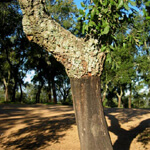
A natural, over-the-counter herbal supplement on the market to help joint inflammation also shows robust ability to curb prostate cancer, according to a rodent study described by researchers from The University of Texas Health Science Center at San Antonio.
The journal Clinical Cancer Research published the study May 1.
The researchers compared two groups of mice genetically engineered to develop prostate cancer. One group was fed a diet that included the herbal supplement, while the other group was fed the same diet minus the supplement. After 20 weeks, all the mice had prostate tumors as expected, but stunningly, tumors were five times smaller in the mice on the supplemented diet. Tumor activity was tracked in three sets of MRI scans done at the Health Science Center’s Research Imaging Center.
“This finding paves the way for a clinical trial to assess the compound’s effectiveness in men,” said lead author A. Pratap Kumar, Ph.D., associate professor of urology at the Health Science Center. “If successful, the supplement will be an inexpensive, readily available, safe and effective agent to shrink at least a subset of prostate tumors. A lot more work remains to be done.”
A low dose of the supplement was just as effective as a higher dose, the study showed. Dr. Kumar noted that there is now much more controlled laboratory evidence for the effectiveness of this compound than for other supplements marketed for prostate health on store shelves.
Herbal supplement derived from bark of cork tree
The herbal supplement, marketed as Nexrutine® by Next Pharmaceuticals of Salinas, Calif., is derived from the bark of the Amur cork tree, which grows in the Manchurian regions of northeastern China and far western Russia.
“I am very excited about this next step by Dr. Kumar in his series of investigations with Nexrutine,” said Ian M. Thompson, M.D., professor and chairman of the Health Science Center’s department of urology. “Our investigators at the UT Health Science Center are looking forward to opportunities to move this agent into clinical trials. This publication by Dr. Kumar is one of the important steps required for the translation of this compound into clinical medicine.”
More than 227,000 new cases of prostate cancer will be diagnosed in the U.S. this year, and an estimated 27,000 deaths will be attributed to the disease.
For more information contact Will Sansom, at 210-567-2579.
The University of Texas Health Science Center at San Antonio is the leading research institution in South Texas and one of the major health sciences universities in the world. With an operating budget of $536 million, the Health Science Center is the chief catalyst for the $14.3 billion biosciences and health care industry, the leading sector in San Antonio’s economy. The Health Science Center has had an estimated $35 billion impact on the region since inception and has expanded to six campuses in San Antonio, Laredo, Harlingen and Edinburg. More than 22,000 graduates (physicians, dentists, nurses, scientists and allied health professionals) serve in their fields, including many in Texas. Health Science Center faculty are international leaders in cancer, cardiovascular disease, diabetes, aging, stroke prevention, kidney disease, orthopaedics, research imaging, transplant surgery, psychiatry and clinical neurosciences, pain management, genetics, nursing, allied health, dentistry and many other fields.

